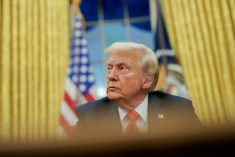Updated March 11
Depending on your political persuasion, you likely watched President Joe Biden’s inauguration in January with relief, worry or some mix of the two. Will we see a more protectionist U.S. government? Will Biden restore capacity at the World Trade Organization (WTO)? What will the mood be of our largest trading partner and next-door neighbour over the next four years?
As I write this, Biden seems to be backing Nigeria’s Ngozi Okonjo-Iweala to head the WTO (the Trump administration was blocking that nomination in favour of South Korea’s Yoo Myung-hee, on the grounds that she had more experience). I don’t know much about either woman, but perhaps the bottom line is that there is some motion there.
Read Also

Growing Canada’s beef herd: CCA’s priorities working with new federal government
This is my first column since the federal election. The Canadian Cattle Association works with all elected officials and parliamentarians, regardless…
We’ve also now all heard that Tom Vilsack is back in as the U.S. secretary of agriculture. You also may have heard that when asked at his confirmation hearing whether he would again consider some version of country-of-origin labelling regulations (mCOOL) for meat products, he said he would consider it only if it was WTO-compliant. He also said that if it was the same policy as four years ago, when he left, “the answer is no.”
I’m sure those of us north of the border would have liked to see a stronger repudiation of mCOOL. But as the Canadian Cattlemen’s Association pointed out to me, although it was disappointing to see mCOOL raised again, Vilsack did acknowledge that any new measures must comply with WTO or face retaliatory tariffs. The WTO has already ruled that mCOOL discriminates against Canadian and Mexican livestock industries, giving both countries the ability to slap the U.S. with $1 billion in tariffs if mCOOL rears its protectionist head again. It’s also worth mentioning that while mCOOL has its supporters in the U.S., a big part of the industry is staunchly opposed there, too.
Still, given these events, recent comments by geopolitical strategist Peter Zeihan seem particularly relevant. Zeihan, who is based in Denver, Colorado, has written two books on geopolitics and worked for the U.S. State Department in Australia, among other interesting career moves. He recently spoke at a virtual event put on by the Alberta Beef Producers.
The gist of Zeihan’s talk was that we’ve reached, or perhaps passed, “peak globalization,” that most countries have aging populations and that means “retirement” economies that don’t offer growth, and that the U.S.’s large millennial demographic offers one of the few exceptions.
Zeihan thinks the COVID-19 pandemic will be under control in the U.S. by September. He’s banking on the Johnson and Johnson vaccine reining in the pandemic, as it only requires one shot and is easier to store and transport than some other vaccines.
Unfortunately, it’s not going to be all sunshine and unicorns this year (in case you were holding out hope). Zeihan predicts a horrible year for trade relations. The U.S. is in no mood to be a world leader, he says, nor is it in a trade-friendly mood. He foresees more trade issues with China and potentially the EU.
One big clue to the U.S.’s mood is Biden’s pick for U.S. Trade Representative Katherine Tai*. Zeihan noted that Tai isn’t experienced at negotiating trade deals, which seems to indicate that the Biden administration isn’t interested in expanding trade. Tai is a top trade lawyer, and previously served as the chief trade lawyer for the House Ways and Means Committee. An NPR story from December 29, 2020, notes that she spent years in the Obama administration fighting trade complaints against China, and is expected to put her experience to use in a trade war with China. Zeihan said that he expects the Biden administration to sue anyone who is seen as violating trade agreements.
What will this mean, exactly, for Canada? Well, the NPR story speculates that part of Tai’s job will be to smooth things over with allies who were ruffled by Trump and leverage those alliances in trade disputes. On the flipside, Zeihan warned that if China cuts imports of American goods due to a dispute, any country that tries to fill that gap will incur America’s wrath.
Tai was also one of the lawyers who worked on the renegotiated NAFTA (or USMCA). Zeihan said that Canada should approach Tai as soon as possible and convince her that, as a NAFTA partner, we should be treated better than more adversarial nations.
You may have noticed that American citizens seem rather polarized over politics these days. That is going to have an effect, too. Zeihan said we can expect the U.S. generally to turn inward and Biden to try to redevelop bipartisan ground. In other words, it’s still America First, at least for now.
This may seem like a very pessimistic reading of the situation. I think there is still opportunity for beef producers in international markets, but it also looks like there is risk of becoming collateral damage in a trade war or due to internal U.S. political factors (the cancellation of the Keystone XL Pipeline earlier this year being one example of that). As we’ve seen several times, our agriculture industry is often among the first victims in these skirmishes. It’s a good time to make sure our business risk management programs are effective, and that the industry and governments have solid plans in place in case of trade disruptions.
*A previous version of the story stated that Katherine Tai is the new U.S. Trade Representative. While she has been nominated as U.S. Trade Representative by President Biden, she had yet to be confirmed at press time.















